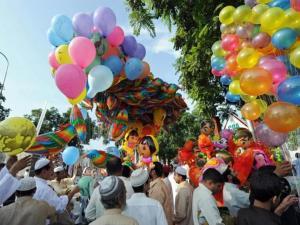Short Description
With a bag clinging to his shoulder, Farhan Ali was pacing from one counter to another at sprawling Karachi cantonment railway station to buy a ticket to travel to his hometown to celebrate `Eid Al-Fitr, which is barely a day or two away, with his family.
With a bag clinging to his shoulder, Farhan Ali was pacing from one counter to another at sprawling Karachi cantonment railway station to buy a ticket to travel to his hometown to celebrate `Eid Al-Fitr, which is barely a day or two away, with his family.
"This (`Eid) is the only occasion when the entire family reunites. I never miss this occasion”, a father of two, Farhan who have been working in Karachi for last 10 years, told OnIslam.net.
Employed as a daily-waged waiter at a restaurant located in the downtown of Karachi, Farhan, 32, is one of the millions of “Perdesi” (a term used for out of home people, mostly for work purpose) who rush to their hometowns to celebrate `Eid with their loved ones every year.
“No ticket” was the answer from the booking clerks at all the counters as the booking was already closed 15 days ago.
“If you can find space to stand or sit on the floor, I can give you the ticket,” a booking clerk attired in white uniform told Farhan in a lighter vein.
`Eid Al-Fitr is one the two main Islamic religious festivals along with `Eid Al-Adha.
After special prayers to mark the day, festivities and merriment start with visits to the homes of friends and relatives.
And while traditionally everyone wears new clothes for `Eid, children look forward to gifts and traditional `ediya (cash).
For people like Farhan, the religious holiday was all about seeing his family after a gap of one year.
Pakistan railway runs special trains a week before `Eid to cope with the huge burden of travelers. But yet, hundreds of desperate people travel atop the wagons due to over-boarding that sometimes causes fatal accidents.
Lack of job opportunities and grinding poverty have forced millions of Pakistanis from under developed cities and towns to flock to the metropolitan cities like Karachi, Lahore, Faisalabad, Rawalpindi and capital Islamabad to earn livelihood for their families.
A majority of them, who work as laborers, waiters, watchmen, drivers, painters, and plumbers and other household workers, do not keep their families with them due to high living expenses.
Family `Eid
Hailing from northeastern Rahimyar Khan district, Farhan was offered triple the wage he normally gets by his employer who runs out of waiters during `Eid holidays, but he turned down the offer.
“I know I could have earned more (higher wage and tips) here (on `Eid) but the charm of celebrating `Eid with my parents, wife, and kids is simply irresistible,” Farhan said.
“I just can’t wait to see my kids after a year,” an apparently jubilant Farhan said.
Karachi’s Saddar town, Lahore’s Anarkali bazaar, or Peshawar’s Kissakhuwani bazaar, where workers flock to get hired, wear a deserted look on the occasion of `Eid.
The capital Islamabad, a beautiful and well-planned city of around 2 million people, is literally empty on `Eid as right from top government officials to ordinary household workers leave the city as soon as the government announces `Eid holidays.
Sabir Hussein, 40, from northeastern Vehari district, who owns a small tailoring shop in a middle-income area in Karachi, shares the same feelings.
“It’s not only the family reunion, but the childhood friends and schoolmates who have scattered across due to nature of their jobs, gather (at hometown) on `Eid,” Hussein, who managed to procure a ticket but was not sure if he would be able to get space in the already jam-packed train, told OnIslam.net.
Buses are the alternative to over-packed trains but an exorbitant increase in the fares make it hard for the poor people to cope with.
Despite the government’s warning of stern action, the bus owners increase the fares by three folds on the eve of `Eid.
“Reaching home (on `Eid) is a task (because of huge rush), rather a difficult task. But the charm of celebrating `Eid with family and friends propel me to live up to it,” a jolly Hussein said.
“We wait for this occasion the whole year. We not only have home feasts but see our families and friends after a year,” he maintained.






![نصيحتي لك: اذكر الله [1 / 12] نصيحتي لك: اذكر الله [1 / 12]](https://www.islamstory.com/images/upload/content_thumbs/1913613138ragheb-al-serjany-videos.jpg)


Comments
Send your comment